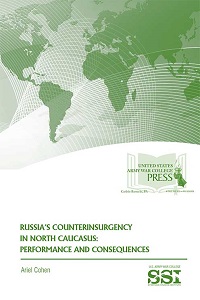Russia's Counterinsurgency in North Caucasus: Performance and Consequences

Authored by Dr. Ariel Cohen.
March 2014
114 Pages
Brief Synopsis
The North Caucasus region has been a source of instability for the past several centuries. Most recently, Chechen aspirations to achieve full independence after the break-up of the Soviet Union led to two disastrous wars. While the active phase of the Chechen conflict ended in 2000 – more than a decade ago—the underlying social, economic, and political issues of the region remain. A low-level insurgency continues to persist in the North Caucasus region, with occasional terrorist attacks in the Russian heartland. There are few reasons to expect any substantial improvement in the situation for years to come. Chechnya functions as a de facto independent entity; Islamist influence in Dagestan is growing, terror attacks continue, and the rest of the North Caucasus requires massive presence of Russian security services to keep the situation under control. Preventing the North Caucasus from slipping back into greater instability requires tackling corruption, cronyism, discrimination, and unemployment—something the Kremlin has so far not been very willing to do. “Small wars” in the Caucasus resonated as far away as Boston, MA, and more international attention and cooperation is necessary to prevent the region from blowing up.
Summary
This monograph examines the underlying issues behind the continuing low-level Islamist insurgency movement in the Russian North Caucasus. It begins by analyzing the history of relations between the Russian and the North Caucasus nations, focusing specifically on the process of subjugating the region by the Russian Empire. Since the 18th century, Russia has used brutal force to expand territorially to the Caucasus. The mistreatment of the North Caucasus continued after World War I and especially during and after World War II, when entire North Caucasus nations faced persecution and forcible deportations to remote parts of the Soviet Union—in which up to 30 percent of the exiles perished. Thus, the Russians planted the seeds of resentment and hatred toward them that persist to the present time.
These tragic events lie at the heart of the grudges the Chechens, the Ingush, the Circassians, and other North Caucasus nations feel against the Russians. Right after the fall of communism in Eastern Europe and the breakup of the Soviet Union, these grudges came to the surface. Chechnya tried to break free from what the Chechens considered occupation of their lands by the infidel Russians. Its attempt was suppressed in two wars so as to preserve the territorial integrity of the Russian Federation.
The First Chechen War lasted from 1994 to 1996 and revealed a startling lack of combat readiness of the Russian military. However, Russia learned military lessons from the botched 1994-96 campaign and handily won the Second Chechen War of 1999-2000. Both Chechen wars resulted in tens of thousands of casualties (both military and civilian) and hundreds of thousands of refugees.
After the wars, Moscow used vast funds to rebuild Chechnya materially, but the grudges of the people have remained. Stability in Chechnya now depends on the current Kremlin-appointed Chechen president, Ramzan Kadyrov. Moscow continues to allocate significant federal funds for Chechnya and turns a blind eye to local corrupt practices, which are often a direct violation of the Russian federal law.
Without immediate, thorough, and concerted international action, the challenges that the North Caucasus presents to the world may grow into major problems. The United States must engage its allies and work with Russia to strengthen its border security, invigorate law enforcement and counterterrorist cooperation with national and international agencies, counter Islamist propaganda, improve intelligence capabilities, and appeal for international cooperation to eliminate the financial support of terrorism that helps North Caucasus militant groups flourish.
Access Full Report [PDF]: Russia's Counterinsurgency in North Caucasus: Performance and Consequences
|
NEWSLETTER
|
| Join the GlobalSecurity.org mailing list |
|
|
|

